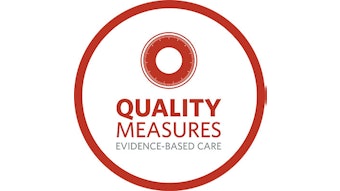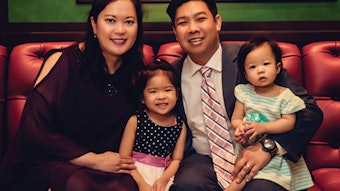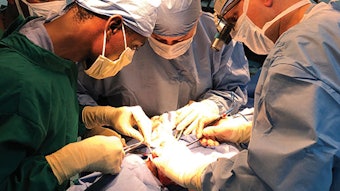Competency: It is everyone’s responsibility
Surgical competency is characterized by three S’s: solid knowledge base, sound judgement, and surgical skills. While medical knowledge may be assessed with examinations and recertification, surgical abilities and judgment are more challenging to determine and characterize.
From the AAO-HNSF Patient Safety and Quality Improvement (PSQI) Committee
David H. Chi, MD
Associate Professor, Department of Otolaryngology
Clinical Director, Division of Pediatric Otolaryngology, Children’s Hospital of Pittsburgh of UPMC
Surgical competency is characterized by three S’s: solid knowledge base, sound judgement, and surgical skills. While medical knowledge may be assessed with examinations and recertification, surgical abilities and judgment are more challenging to determine and characterize. With further emphasis on quality and safety, surgical competency has become an important aspect of residency training. This concept also extends to otolaryngologists throughout their practice, from early career up to the point of retirement. We highlight the issues of surgical competency that are encountered as a resident, practicing physician, and aging physician.

Residency training
Traditional surgical training has been based on the apprentice model. The concept of “observing, doing, and teaching” a surgical procedure had been the major method of training for the majority of today’s practicing surgeons. Surgeons have successfully trained with their mentors and have incorporated lessons learned from unstructured observations into successful practice. Education, however, continues to become more standardized. For surgical specialties, such as otolaryngology-head and neck surgery, case log reporting attempts to ensure that residents meet minimum expected standards for graduation. Yet increasing experience does not guarantee competence. Therefore, efforts to measure and assess progressive improvement in residency training has led to the establishment of six core competencies. The Accreditation Council for Graduate Medical Education (ACGME) adopted that periodic review be completed of every trainee that encompasses these competencies:
- Patient care
- Medical knowledge
- Practice-based learning and improvement
- Interpersonal and communication skills
- Professionalism
- System-based practice
Routine evaluation of these outcomes provides a measurement of improvement during residency training. The majority of residents are expected to demonstrate successful progression throughout the course of training. Those that do not meet expected standards are identified early, and remediation plans may be initiated. In addition to experiential learning, current residency training has also benefited from advances in technology. Innovative educational models such as hand motion analysis, simulation (animal, cadaveric, 3D-printed models, and virtual reality), and eye tracking continue to provide additional opportunities to monitor surgical competency.
Practicing otolaryngologist
Patient safety and quality is of the utmost importance during the practicing physician’s career, and surgical abilities are inherently related to procedural outcomes. The importance of competency becomes emphasized when surgeons are evaluated for credentialing and hospital privileges. Historically, surgeons are granted hospital privileges after a subjective evaluation, often based on overall impressions of the medical provider, and this review is repeated every two years.
In 2007, The Joint Commission introduced its Ongoing Professional Practice Evaluation (OPPE) and Focused Professional Practice Evaluation (FPPE) processes.1 These tools help to transition from subjective provider evaluations to objective evidence-based measures.
OPPE is a screening tool to evaluate all practitioners (surgeons and advanced practice providers) who have been granted privileges and to identify those clinicians who might be delivering an unacceptable quality of care. These evaluations are especially applicable to new surgeons, low-volume practitioners, and those introducing new procedures to the institution. OPPE is dependent on the institution and may include reviews of operative and clinical procedures and their outcomes, patterns of pharmaceutical usage, lengths of stay, and morbidity and mortality data. This information may be obtained through periodic chart review, direct observation, monitoring of diagnostic and treatment techniques, and discussion with other individuals involved in patient care.
The information gathered during this process contributes to the decision to maintain, revise, or revoke existing privileges prior to or at the end of the two-year review of the privilege renewal cycle. Typical OPPE is required of all active providers on a regular basis, such as every three or six months. A peer group or committee headed by department or division leaders and quality and safety champion individuals must review the data.
FPPE is the follow-up process to determine the validity of any findings found through OPPE. FPPE may also be initiated because of an egregious event or pattern of preventable unsafe behaviors. FPPE also serves to identify providers with poor technical skills, disabilities, poor judgment, or other impairments that affect patient safety.
The aging surgeon
Like all individuals, surgeons encounter physical changes with age. Visual and hearing capabilities decline. Cognition, visual-spatial ability, and memory capacity may be reduced compared to earlier in one’s career.
Mandatory retirement is approved in some professions, such as commercial airline pilots (65 years), National Park Rangers (57 years), and FBI agents (57 years). Mandatory retirement of surgeons does not exist. As more surgeons become employees of hospital systems, they are guarded under the Age Discrimination in Employment Act and cannot have a mandatory retirement age.
The current recommendation from the American College of Surgeons is that, starting at age 65 to 70 years, voluntary and confidential baseline physical examination and visual testing occur.2 In addition, surgeons should voluntarily assess their neurocognitive function with online tools. Only a few medical centers have bylaws requiring age-based evaluations.3 Those that have established policies have encountered scrutiny from the medical staff and raised questions of unfair ageism.
Controversial questions remain: Should age ever factor in the surgeon’s competency evaluation? Should a senior surgeon have a periodic review of practice? Should evaluations be voluntary or mandatory?
Summary
The importance of quality and safety in patient care is increasingly a priority with high expectations from medical professionals, societies, and the public. This emphasis has resulted in changes that impact an otolaryngologist from their training years and span the entire career. The evolution of medical education has created higher standards for our current residency graduates. The Joint Commission has also created an expectation for departments to have an ongoing objective process of evaluating healthcare providers that addresses issues with safety and quality of outliers, low-volume providers, and credentialing for new procedures. Lastly, surgeons in the latter aspect of their careers may now have expectations to demonstrate competency to provide the high standards of patient care and quality expected from our specialty and the public.
References:
1 Joint Commission Standards Frequently Asked Questions. Joint Commission Web site. http://www.jointcommission.org/standards_information/jcfaq.aspx?ProgramId=40.
2 American College of Surgeons Board of Governors Physician Competency and Health Workgroup. Statement on the aging surgeon. Bull Am Coll Surg. 2016;101(1):42-43.
3 Dellinger EP, Pellegrini CA, Gallagher TH. The Aging Physician and the Medical Profession: A Review. JAMA Surg. 2017 Oct 1;152(10):967-971.












